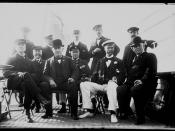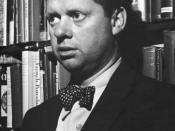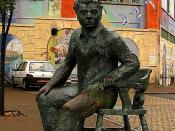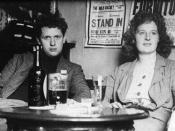For years romantics have led us in many different directions. Through songs and poetry we have been touched, moved, and led through journeys of blind faith. As members of the human race, we are emotionally motivated and are intrigued by the concepts of love and nature. From nature, life is forged, and throughout time few people have actually stopped to enjoy this amazing gift that was given to us. In the past, a few poets and songwriters have shown us that people do not need all the material possessions that they have come to worship. These people were known as Romantics. One major influence on romantic writings was Dylan Thomas. In his poem "Fern Hill", he uses imagery to describe nature in all its beauty and graciousness.
Thomas was born in 1914 in Swansea. His father, John, had a degree in English, and although his native tongue was Welsh, he preferred to use English.
Thomas's summer holidays involved spending great time at his aunt and uncles dairy farm in the country. He began writing poetry as young as eleven years old. These vacations were one of the many things that inspired him to write such poems as "Fern Hill". In 1931 he dropped out of school and took a job as a reporter for the local newspaper. Some believe this did not work out very well because of the intense structure involved in that particular style of writing. Eventually he was fired from his position at the newspaper and decided to pursue his dream as a free-lance writer. By the age of 15 he was already a heavy drinker. He would often skip work to sneak into bars and get drunk. By 1933, he was already getting his works published and having them read aloud on live radio. He soon left Swansea because it was terribly boring for him. He ran away to London, England where he continued his alcohol addiction. Thomas had a beautiful speaking voice, so by 1937 he was being offered jobs as a poetry reader for the "British Broadcasting Corporation". He would read other people poetry aloud over the radio. This connection with the BBC, allowed him to eventually read his own poetry over the air. In 1937, he married a young dancer named Caitlin Macnamara. Unsurprisingly, their wedding involved a plethora of alcohol. When England became involved in a war, he was exempted from the draft for being physically unfit due to his scarred liver from years of drinking. However neighbors believed he was just an objector to war, and he was beaten up on several occasions. By then Thomas had made several publications, compiling many of his best works. Such compilations included "18 poems" and "Deaths and Entrances". In 1950, Thomas made his first tour of the United States of America to make some extra money. In 1953, He made his first reading of his new play "Under Milk Wood" at Harvard University. During his reading he collapsed with alcohol poisoning and died later at a New York hospital. He died reading poetry, the one thing that he truly loved (www.bbc.co.uk/history/programmes/centurions/thomas/thombiog.shtml, 1997).
One critic of Thomas's works is a man by the name of Lorenzo Simpson.
Dylan Thomas's poem "Fern Hill" it is Time, ôin the mercy of his means,ô which lets us be what we are. This strange expression refers us to the time of growth, aging, and death. This time is no indifferent medium, measured by the ticking clock, but an ally and a judge (Simpson, 24).
This is romantic because it breaks down the barriers of conformity and lets one be his own self. Finding one's true self on his own without help from society is romantic because one has to reach into one's inner self, and pull out the true being. Simpson believes a self-understanding that translates meanings into values is consistent with the unquestioning faith in technology of our times (24). This is found true in the sense that people today have gotten too involved with their material possessions and modern technology, that they simply cannot invest time needed with nature. Simpson's critiques appear to be that of what one would also see in some of Thomas's writings.





